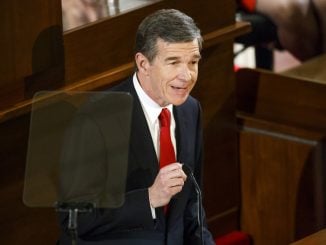RALEIGH – Gov. Roy Cooper signed the COVID-19 relief package passed by the General Assembly into law. The package spends $1.5 billion in areas such as health care, education, and business support.
“I am signing into law two critical relief bills that will provide assistance to families, schools, hospitals and small businesses as our state battles COVID-19,” said Gov. Cooper. “There is more work ahead of us, and I hope the spirit of consensus behind these bills will continue.”
The Governor was joined by legislative leadership at the Emergency Operations Center in Raleigh. House Speaker Tim Moore, Democratic House leader Darren Jackson, Senate President Pro Tem Phil Berger and Democratic Senate leader Dan Blue all commended the bipartisan consensus that led to unanimous passage of the legislation.
“The General Assembly crafted a bipartisan COVID-19 relief package that puts North Carolina on the right path to recovery. Governor Cooper’s signature on these bills sends a signal to our citizens that our state is moving past this crisis and that action is being taken to address their concerns,” said Senate President Pro Tem Phil Berger.
“I am proud of the work that we have done in the Senate to address the pressing needs in our state,” said Senate Democratic Leader Dan Blue. “I look forward to working with Senator Berger on the next COVID-19 relief package so that we can build a stronger, more resilient for all North Carolinians.”
“North Carolina is leading the nation’s recovery through bipartisan consensus for swift action to assist every community in our state affected by this pandemic. I appreciate the successful collaboration among our legislative colleagues and the Governor to provide this powerful support for North Carolinians.” said Speaker of the House Tim Moore
“Citizens expect bipartisan progress and we are off to a good start. Now we need to do more for front-line workers, the unemployed, and people without health insurance.” said House Democratic Leader Darren Jackson.
The final appropriation numbers are $1.4 billion being spent as stated in the relief package and $150 million is set aside in a reserve fund for future needs.



